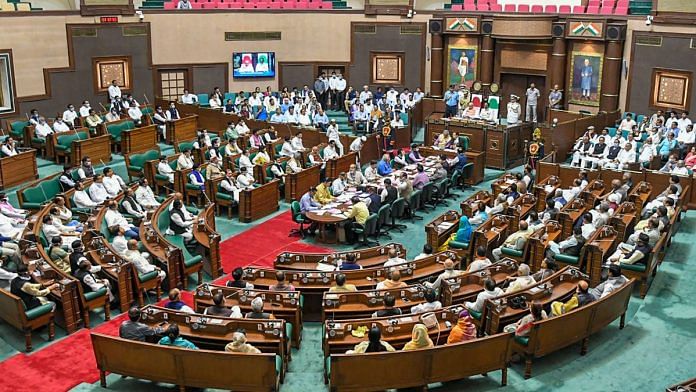New Delhi: The Supreme Court Monday upheld Madhya Pradesh Governor Lalji Tandon’s March decision asking the then Kamal Nath led-Congress government to prove majority by holding a floor test in the Legislative Assembly after the resignation of 22 Congress MLAs.
A bench, comprising Justice D.Y. Chandrachud and Justice Hemant Gupta, ruled, “… in a situation where the governor has reasons to believe that the council of ministers headed by the chief minister has lost the confidence of the House, constitutional propriety requires that the issue be resolved by calling for a floor test. The governor in calling for a floor test cannot be construed to have acted beyond the bounds of constitutional authority.”
It also lamented political horse-trading, asserting that the “spectacle of rival political parties whisking away their political flock to safe destinations does little credit to the state of our democratic politics”.
While the SC opined that it is best for courts to maintain an “arm’s length from the sordid tales of political life”, it highlighted the need for law to evolve “to address these burgeoning evils”.
The Supreme Court had on 19 March asked assembly Speaker N.P. Prajapati to reconvene a special session the next day to conduct the floor test.
The order was issued on a petition filed by the BJP, demanding a floor test after Prajapati adjourned the session instead of heeding to the governor’s direction to conduct a floor test. Following this, then-chief minister Kamal Nath resigned on 20 March.
Also read: Jyotiraditya didn’t want to become Rahul. He could’ve become Sachin. Will end up like Varun
SC referred to 1994 S.R. Bommai case
The court decided on two questions before it: whether the governor can call for a trust vote in the course of “running assembly” and whether he has exercised this authority correctly in this case.
To answer the first question, the court referred to Constituent Assembly debates and noted that it vests certain discretionary powers on the governor under Article 163 of the Constitution.
Article 163(1) says the council of ministers headed by the chief minister should aid and advise the governor.
Article 163(2) says if there is a question on whether or not the governor should be acting in his discretion on a particular matter, his decision on the discretion shall be final.
Defending its decision to not conduct a floor test, the Kamal Nath government had relied on Article 163(1) to contend that the governor should have consulted the council of ministers before calling for a floor test.
The court, however, referred to the 9-judge bench decision in the S.R. Bommai case, and considered a scenario where the governor believed that the incumbent government does not have majority support. In such a case, it said the correct course of action would be for the governor to call the chief minister to face the assembly and to establish majority within the shortest possible time.
Governor’s decision not Constitutionally improper
The court also rejected the contention that the governor can ask the council of ministers to prove their majority only right after the elections are held and not later.
“The governor is not denuded of the power to order a floor test where on the basis of the material available to the governor it becomes evident that the issue as to whether the government commands the confidence of the House requires to be assessed on the basis of a floor test,” it observed.
The court then considered the circumstances under which Tandon had advised the floor test to be conducted and opined that “the exercise of power by the governor to convene a floor test cannot be regarded as constitutionally improper”.
It also rejected the contention by Dr Abhishek Manu Singhvi, appearing on behalf of Speaker Prajapati, that a trust vote would impinge on the speaker’s discretion to accept the resignation or decide the consequences of the resignations.
“Neither the governor nor for that matter the court can entrench upon the power of the Speaker, but the pendency of the proceedings before the Speaker cannot be a valid basis to not have the confidence of the House in the government determined by the convening of a floor test,” it said.
Also read: Madhya Pradesh’s edge-of-the-seat politics gave tough competition to coronavirus on headlines



